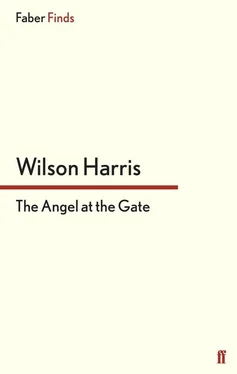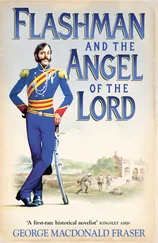Marsden receded into the mirror. He had spoken without speaking. Perhaps for the last time. As his silent voice faded Mary recalled the anguish she had experienced when she had typed an article he had written on the Soweto riots in South Africa. The keys of the typewriter descended again under her fingers in the mirror and left her shaking with fright. Over two hundred young people had been shot in the streets. The next day was pay day in Angel Inn. Should she send her pay to the bereaved? Was money tainted gold? How could sterling be tainted? Nonsense! Rand perhaps, not sterling. If sterling were to be married to rand then too must roubles, dollars, yen, francs, and every denomination subsisting on gold as far back as Atahualpa.
“I know what I’ll do,” Mary said to her fingers in the deaf mirror, “I’ll ask Stella to collect my pay. I’ll scribble a note to Father Marsden. He won’t mind. He’ll understand.”
There she was. Stella. In the shower. The faintest suggestion of a line of bullets running across her thin shoulders. Flawed but attractive limbs, slightly out-thrust stomach. Her hips flared like a subtle tide, a subtle moon, and it came as an astonishment to Mary to see her naked in the street, a bit thin perhaps, walking along the pavement towards Hammersmith and Angel Inn. The other pedestrians saw nothing but a coat and a dress, high-heeled shoes, a bag on one arm. She wasn’t wearing her slacks this time.
Mary read their obliviousness of Stella’s faintly bullet-ridden, naked body in the mirror. It was true that she (Mary) was as oblivious as they — she was oblivious of their hidden global wounds as they were of Stella’s. She was as oblivious as they were of punctured camouflage or metaphysical strip-tease genius in their midst. And yet in confessing to their obliviousness — in perceiving it so starkly — she seemed to see through their eyes not only how blind they were but the endangered messenger one sends time and time again out of oneself in dream or involuntary reverie into an unexpected shower of bullets, hard rain out of the sun that leaves a pool of blood.
Stella advanced in the street towards Angel Inn, a slim, tantalizing target, high-heeled trance. She came to the door of the house, entered the Inn, moved along the hall into the study. She paused in the mirror close to where Mary now stood, inspected roses that summer long past where irises now stood.
The money she had come for was there within the manuscript that Mary had typed. Marsden was absent. He had left the coast clear. Better to make such exchanges of daemonic currency as bloodless as possible. One needed the daemon to buy food, pay the rent, buy clothing, pay electricity and gas, income tax, bus fare, rail fare, bale fare into the stars, chariot fare for christenings and weddings…. And, said the voice in the deaf mirror, let it be done in all decency by a bloodless machine or, if not that, by Anancy sleight-of-hand in which the giver and the receiver run from each other when the deed is accomplished.
Had Marsden been there he might have been tempted, in all the circumstances, not to run but to stay and to kiss Stella’s thin shoulders. A kiss to cure faint bullets. Better a kiss than a wound one cannot bear to contemplate. Better a blessed pound note slipped from between the pages of a book than prostitution of body and soul. Better the veil of spring or winter or autumn blood in all its celebrative beauty of flowers and vegetable gardens than money that speaks aloud, weapons that drink milk and chew bread, one man’s investment that turns into another man’s or woman’s or child’s seed or grave in the depths of past and present, past and future place and time.
*
Jackson walked past naked Stella in the street. The mirror picked him up and bore him past her (as if she were not there) to North Pole Road. He switched on his radio in search of the blues or Mozart. The batteries were low and the voice reporting the news of the Brixton riot seemed to come from a far way off. Another planet. It was a thoroughly British accent. Not foreign…
*
Stella returned to Dolphin Street to find an angry and bewildered Sebastian. That very day (Mary’s pay day) he had lost his job as an electrician and been told that his qualifications were inadequate. The sight of Stella with money he had ceased to earn aroused a depth of frustration in him allied to passion, a sensation of injustice, and of belonging to inchoate consensus or body of unemployed millions around the globe. Mary had left when Stella returned. She knew how to be “absent” when Sebastian’s “crowd” or “consensus of deprivation” erupted and drew her into bed.
Sex was sometimes better than “speed” to place a seal upon his undervalued life and the undervalued lives of others.
In coming by degrees to run into darkness and see little, he acquired a terrible protection against seductive horror. He acquired also the subtlest link to Marsden’s “death” or “withdrawal into the mirror of space” and to Mary’s “absence from herself” in Stella. Their fictional death and absence resembled his need for protection, and his need resembled their comprehensive acceptance of layers of non-sensibility to offset total despair. His collective darkness remained therefore a shared reality of individual psyche. To see as they saw with stark complexity was to pay a price for his non-sensibility and to incorporate his eyes and ears into their minds and into camouflaged intercourse with history, the violations, the pathos, the brutality, and yet the paradoxes of protective armour — even death — upon each profoundly vulnerable witness. ( There —Mary saw in a flash in Angel Inn mirror that drew into itself worlds as a pool draws an ocean — lay an approach to the camouflage of diminutive seed, essential life, that torments and teases heart and mind in living epitaphs that surviving, embracing creatures are for extinct species.)
Now —as he drew Stella into bed — Mary perceived him and Stella as through “absent body” from a meaningfully distorted angle in the mirror.
That angled intercourse with history spoke as she listened to deaf and silent mirror gathered between them into each other’s crowded arms — crowded with the million facts of birth and death it was hell to bear. “Unemployment is hell” his body asserted to conceal the fires from himself in the way he moved into blank slate or erasure of pain within Stella’s thighs like reversed blackboard of the birth of his son, reversal of emergent child into regressive foetal parent.
*
Jackson switched off the radio in his room, got up, and stroked with an uneasy, absent-minded finger the Flanders poppy on the shelf beside him. The voice of the news-reader detailing events in Brixton still seemed to address him as if it arose now from under his feet or from within the other startled flowers in the room speaking silently to Mary in Angel Inn mirror that flashed upon North Pole Road.
Jackson donned a coat and made his way up into the garden that ran just above and behind his basement flat. He too was suddenly naked in his clothes, not bullet-ridden but scarred by a few random burns he had picked up without knowing it. His legs were slightly bowed with the stalwart defiance of a cricketer rooted in defence of an invisible wicket behind him. Jackson had once played opening bat in the West Indies in 1949 for his University College eleven. The flesh on his bones was now spare as a crumpled tattered dress across the years waiting to slide or to slip on to a pitch of darkness. The hair on his chest was thin, straggly and grey. His body had lost much of its spring as if the memory of the fall from a ladder persisted. Yet there was a vitality, an unpredictable capacity for inner decision.
The garden was neglected; there were two battered buckets, one empty, the other half-filled with mossy soil; there was a wiry rose-bush in one corner and the stump of a sunflower plant in another. A clothes-line ran across the square of the garden and Jackson ducked to avoid it. He paused on the other side with one hand still on the line, his body so angled in Marsden’s supernatural mirror, it seemed about to run on an implicit horizon of space. The back windows of other buildings stared down at him like opaque galaxies, a faint glitter here and there. A blackbird was singing its heart out up on one of the roofs blissfully unconscious of the dereliction of the little garden. Jackson looked up but could not see it. All at once the singing ceased. But not before a curious almost thrilling sadness, thrilling note of warning, descended into the garden and seemed to issue without antecedent from an unseen throat.
Читать дальше












